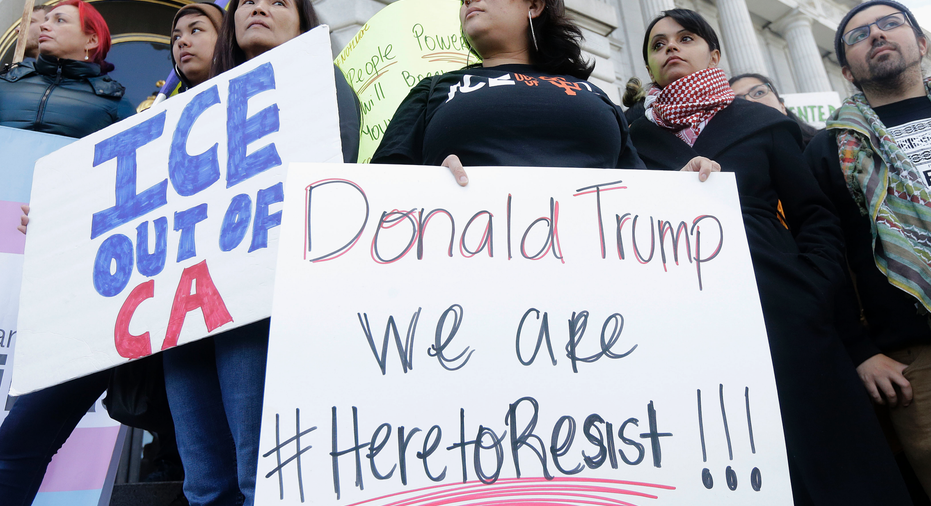California lawmakers to tackle housing crisis, immigration

SACRAMENTO, Calif. – California lawmakers return Monday from a monthlong break with a busy agenda that includes tackling the state's housing crisis and deciding whether to make California a statewide sanctuary for people living illegally in the U.S.
Here's a look at some of the high-profile issues the Legislature will tackle in the last four weeks of business this year. They reconvene in January for the rest of their current two-year session.
HOUSING
With Californians facing high and rapidly rising housing costs, Gov. Jerry Brown and top Democratic lawmakers put housing at the top of the agenda for the Legislature's return.
Brown, Senate President Pro Tem Kevin de Leon and Assembly Speaker Anthony Rendon agreed to advance a package of housing bills.
They said it would include a bond and permanent funding source for subsidized housing — a top priority for many Democratic lawmakers — as well as regulatory changes that make it easier for developers to build affordable housing, one of Brown's priorities.
Legislative leaders have long identified soaring housing costs as a major concern, but they've struggled to find consensus with Brown, developers, labor unions and environmentalists.
CAP AND TRADE MONEY
California got national attention last month for extending the state's "cap and trade" climate law until 2030. The move keeps alive a program that raises hundreds of millions of dollars a year by auctioning off permits to release climate-changing gases.
Lawmakers outlined broad priorities for the money, including cleaner air, zero-emission vehicles, sustainable agriculture, forests and parks. Now they have to decide on specifics — while listening to a loud chorus of interest groups looking for a piece of the money.
Sixty percent of the money automatically goes to high-speed rail, public transit, housing projects and other purposes. Another chunk is committed to cover the cost of tax breaks included in the extension to win support from Republicans and business interests.
The Air Resources Board held the most recent auction last week and is scheduled to announce the results Tuesday. Officials expect a rebound after more than a year of sagging demand tied in large part to uncertainty about whether businesses would need to buy the permits after 2020, when the program was originally set to expire.
SANCTUARY STATE
The Senate voted along party lines to restrict state and local law enforcement agencies from cooperating with federal immigration authorities, essentially making California a statewide sanctuary for immigrants living in the country illegally.
The measure, written by de Leon, is a response to President Donald Trump's campaign promise to step up deportations. It would give California the nation's strongest statewide protections for immigrants.
It has cleared the Senate but has had a tougher run in the more moderate Assembly.
The bill has fired up conservative critics and drawn the rebuke of the California State Sheriffs' Association, which says it would endanger the public and drive immigration enforcement from jails to neighborhoods.
The measure is backed by immigrant and civil rights groups, which say the state needs to protect families living in fear that they'll be split up.
Brown told NBC's Meet the Press that he has concerns and is working with de Leon to address them. He didn't elaborate, and his spokesman Evan Westrup wouldn't say what changes the governor is seeking.
BAIL REFORM
The Senate voted earlier this year to end bail for most defendants as part of an attempt to dramatically redesign the system for supervising defendants awaiting trial.
The Assembly wasn't ready to go that route and rejected a similar measure, but proponents are still working to line up support.
Critics contend the bail system hurts poor defendants who haven't been convicted but must await trial behind bars solely because they're too poor to pay bail and be released. Bail is money or property that can be forfeited if suspects fail to appear for trial.
Some Democratic lawmakers want to give judges more flexibility to decide during arraignment whether to impose bail as a condition of release, taking the defendant's income into account.
The bail industry has aggressively lobbied against the bill, even bringing celebrity bail man Dog the Bounty Hunter to Sacramento to testify against it. The industry says the legislation would endanger the public by allowing dangerous criminals out of custody.



















